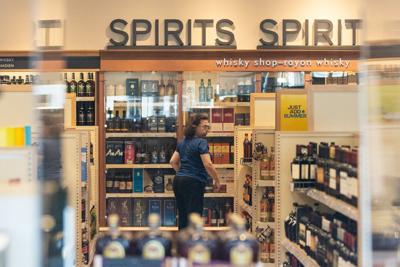Ready for another booze-fuelled brawl?
Some of the biggest alcohol conglomerates on the planet are taking the LCBO to court, saying the provincial liquor monopoly is unfairly fining suppliers over a contractual clause promising to charge it the lowest price in Canada.
The producers┬áÔÇö including Diageo, Campari Group, Beam-Suntory and Brown Forman┬áÔÇö have also reported the LCBO to the federal Competition Bureau, saying the clause is an abuse of the agency’s market dominance and is a restraint of trade.
The head of an association representing the producers said legal action was the last thing they wanted to do.
“This was done more in sorrow than in anger,” Spirits Canada CEO Cal Bricker said in an interview. ÔÇťWe want to come to a negotiated settlement.ÔÇŁ
Asked if the companies are also considering pulling their products from the LCBO over the dispute, Bricker refused to rule it out.
“All options are on the table,” Bricker said.
The companies who are suing produce roughly 70 per cent of the spirits sold at the LCBO, and some of the worldÔÇÖs most widely recognized alcohol brands, including Crown Royal whisky, Absolut and Grey Goose vodka, Bacardi and Appleton Estate rum, Don Julio tequila, Tanqueray gin and aperitifs such as Campari and Aperol.
The suit, filed in Ontario Superior Court on Tuesday, says the LCBO didn’t enforce the clause for a decade, then began actively enforcing it in 2023. Continued enforcement of the clause would result in higher prices than necessary across the country, including Ontario, the suit alleges.
“The disputed provision would inflate retail liquor prices across Canada to an unreasonable extent, by requiring suppliers to raise prices they charge in other jurisdictions,” the alcohol companies argue in an application to toss out the clause.
In a press release, the LCBO blasted the lawsuit, calling the claims “inaccurate and highly misleading.”
“The fact is that when suppliers do not honour our legal agreements on consumer protection, the only people that lose are Ontarians,” the LCBO said in its press release.┬á┬á
The LCBO argued that the money charged to suppliers weren’t fines, but “pricing chargebacks levied in accordance with terms of our long-term contracts.”
“Our position remains that it would not be fair to let a few suppliers gouge Ontario consumers,” the LCBO added.
Previously, the LCBO has said that just 10 per cent of its suppliers have failed to comply with contract conditions. 
Legal sources said any court decision could be up to a year away, and that the two sides could still try and reach a negotiated settlement of the dispute. 
A spokesperson for the Competition Bureau confirmed the Bureau had received a complaint from alcohol producers alleging anti-competitive behaviour by the LCBO. The spokesperson said that following receipt of a complaint, the Bureau examines the facts to determine if an official investigation is warranted, but declined further comment, citing privacy restrictions.
The move comes just a day after LCBO stores opened up following the first strike in the agencyÔÇÖs history.
Over the last year, the LCBO has fined suppliers┬áÔÇö including some of the biggest alcohol conglomerates in the world┬áÔÇö well over $100 million, saying that theyÔÇÖd breached the controversial “clause 14.”
The individual fines, according to industry sources, have ranged from a few thousand dollars, to well over $1 million.
Competition law experts and anti-monopoly advocates say it’s rare for a government-owned agency to be sued, and said the case could have implications for other government-run or government-mandated monopolies, including milk marketing boards.
“I donÔÇÖt know how itÔÇÖs going to come out. ItÔÇÖs an interesting battle of titans and it could be a first shot across the bow of supply managed systems in general,” said John Lawford, executive director and general counsel at the Ottawa-based Public Interest Advocacy Centre.
Keldon Bester, executive director of the Canadian Anti-Monopoly Project, said “most-favoured nations” contract clauses are coming under legal pressure in the U.S., and can end up forcing suppliers to raise prices they charge to other retailers.
ÔÇťUsually, the theory is that competition helps lower prices. But when the buyer is big enough, these types of clauses can have the effect of raising them,ÔÇŁ said Bester. “I think it’s a legitimate competition issue.”
Retail consultant Bruce Winder says it’s rare for disputes between suppliers and retailers reach the public eye, and even rarer for them to end up in litigation.
The spirits producers’ legal action, says Winder, is even more unusual than a spat between Pepsi-Frito Lay and Loblaw Cos. which saw the snack-food producer briefly pull its snack foods from the biggest grocery operator in the country over a pricing dispute two years ago.
ÔÇťThis isnÔÇÖt just one supplier. This is basically an entire industry,” said Winder. ÔÇťItÔÇÖs very rare to have an entire class of suppliers go after a retailer.ÔÇŁ
Spirits Canada said in May its members were considering everything from pulling some of their products out of Ontario to a potential lawsuit.
After months of conversations with the LCBO over two previous sets of fines, Spirits Canada said in May that its members were concerned that the fines ÔÇö which can be issued roughly every three months ÔÇö will continue.
CorrectionÔÇöJuly 24, 2024: The subheadline on this article was edited from a previous version that mistakenly said Spirits Canada is suing the LCBO.

































To join the conversation set a first and last name in your user profile.
Sign in or register for free to join the Conversation